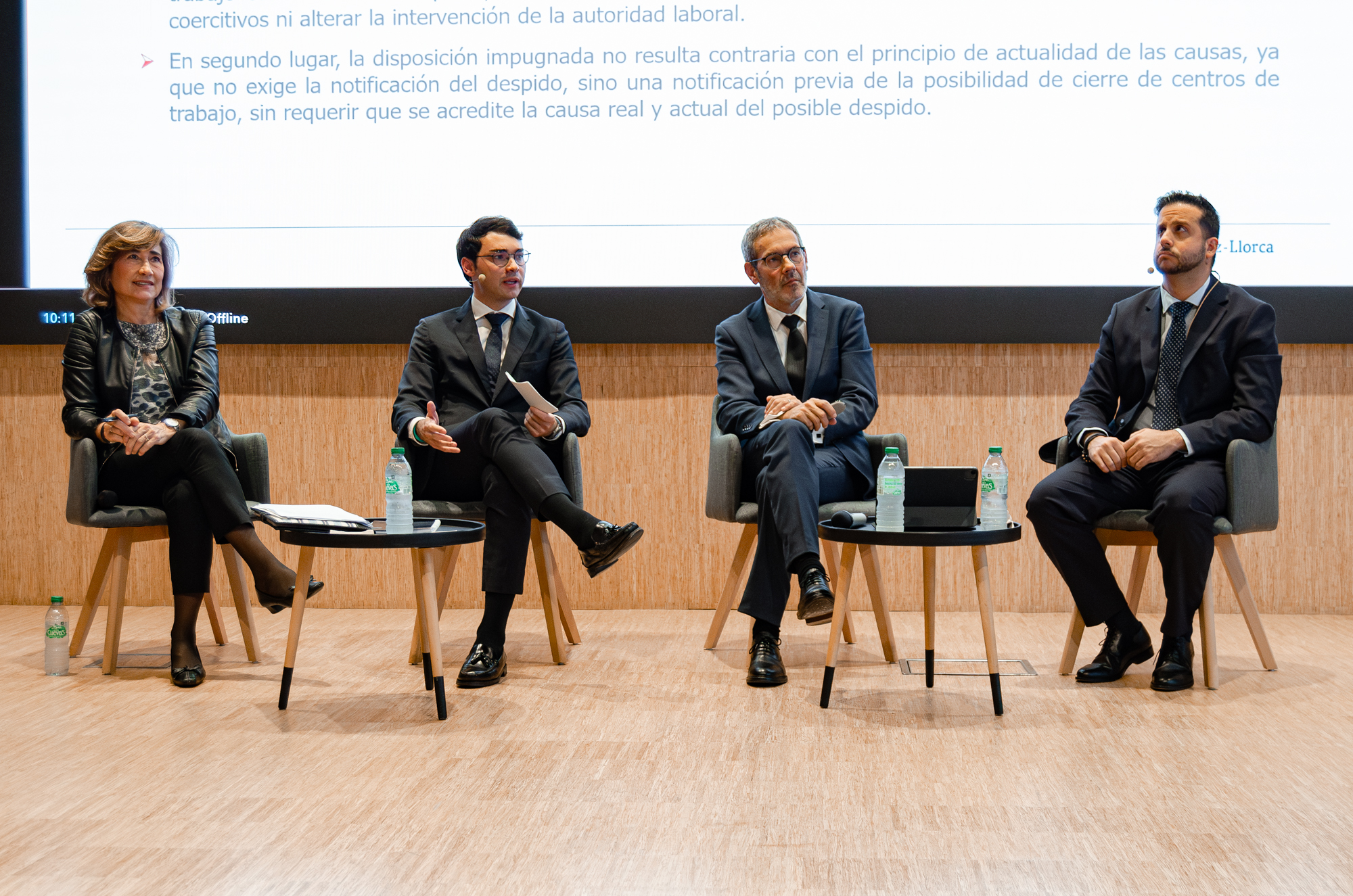Pérez-Llorca’s Employment, Compensation and Benefits practice area organised the session entitled “Employment law developments and trends 2024. A focus on the digitalisation, interoperability and accessibility of the new registration of working hours”. The seminar was attended by Manel Hernàndez, Yolanda Valdeolivas and Marc París, partner, of counsel and lawyer at Pérez-Llorca, respectively, alongside Alejandro López Jiménez, Labour and Social Security Inspector for the Barcelona Provincial Directorate.
Manel Hernàndez opened the event by introducing the speakers and then gave the audience an overview of each of the topics up for discussion. Yolanda Valdeolivas then began by addressing recent legislative trends in various areas of employment and social security law, highlighting, in particular, three key points on the controversial issue of reduced working hours. She discussed the latest developments and the state of play at the social dialogue table with trade unions and employers, where no draft regulation has yet been offered and where the Ministry recently proposed the 375 Plan for SMEs and a vague accompanying programme; the more than likely application of the objective of reaching a 37.5-hour working week by 2025, without the intermediate step of 38.5 hours; and the position of the Spanish Confederation of Business Organisations (CEOE), which advocates respecting the current validity of the collective agreements regulating this matter, so as not to undermine the integrity of the conventional instrument or its inherent balance.
Valdeolivas also addressed the current problems involved in the termination of employment contracts following a declaration of permanent disability, as a result of the Court of Justice of the European Union’s ruling of 18 January 2024. According to this judgment, before terminating a contract, an employer must make reasonable adjustments to the disabled person’s job, which poses difficulties and raises questions around interpretation that the current proposed law leaves unresolved. Hernàndez pointed out that there are already numerous dismissal claims underway invoking this ruling, in which parties are requesting additional compensation for an infringement of their fundamental rights.
Valdeolivas also highlighted the impact of the European Committee of Social Rights’ recent pronouncement on the adjustment of the Spanish compensation system to EU law in the event of unfair dismissal, although she pointed out that it is not certain that the government will make effective modifications during this legislature, as this is a contentious issue both within the Spanish executive and in parliament.
She also mentioned the Social Agreement on Pensions, which was formally signed in September 2024 and which introduces a number of changes to early retirement and to the formulas for partial and active retirement, in addition to the proposals to amend the Law on Occupational Health and Safety. “These amendments aim to adapt the regulation to the challenges of digitalisation, underlining the need to balance the worker’s right to disconnect with the company’s production requirements,” Valdeolivas concluded.
Marc París outlined ten of the most recent judgments, and dedicated the last part of his speech to an explanation of the three most significant ones. The first of these rulings confirmed that expenses paid by an employer are considered “remuneration” under Directive 2006/54, with no indirect discrimination on grounds of sex in the case of those received by cabin crew and pilots. “It would only be considered indirect discrimination if the pay differential applied to work of equal value, and in this case, the work of crew members and pilots differs in training and responsibility,” París explained.
As for the second, París explained that the Court of Justice of the European Union recently ruled that Directive 2008/104/EC, which regulates temporary agency work, applies to any entity that provides workers to a user company, regardless of whether they are specifically recognised as a temporary employment agency under the national legislation of each country.
Lastly, he analysed the recent ruling on workers’ cooperatives, stressing that the latest pronouncements in this area underline how important it is for them to have their own specific infrastructure. This, he pointed out, is key to preserving this business model and thus preventing cooperatives from operating as mere intermediaries in subcontracting processes.
Hernàndez noted that the first ruling contradicts Spanish regulations on expenses by treating them as a de facto equivalent to salaries. He also mentioned that the recognition of the 10 additional weeks of leave for single-parent families in the Basic Statute of Public Employees would have repercussions on employment relationships regulated in the Workers’ Statute, as there is no objective reason allowing for different situations in these cases, something that has already been confirmed by the Supreme Court in a recent judgement in the labour jurisdiction.
During the third part of the event, Alejandro López addressed the evolution of the registration of working hours, noting the Spanish High Court Ruling of 4 December 2015, which made it mandatory for all hours worked, and the Supreme Court Ruling of 23 March 2017, which suggested a reform to clarify Article 35.5 of the Workers’ Statute. At present, registering working hours is regulated under Article 34.9 of the Statute, with the obligation to record only the times of entry and exit. López stressed that not registering this time means that the entire working day is considered to have been worked, and underlined the importance of the new digital register meeting the criteria of objectivity, reliability and accessibility. “The development of digital tools must take into account the case law of the European Court of Justice and the Spanish Supreme Court to ensure their effectiveness and legality,” said López.
